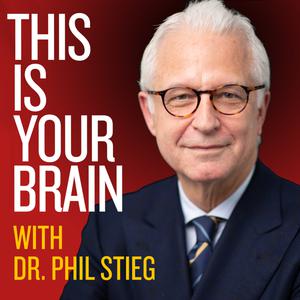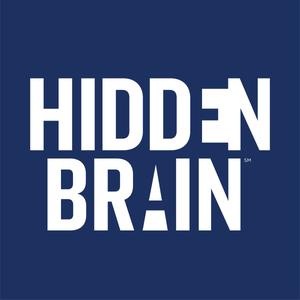
This Is Your Brain With Dr. Phil Stieg
Weill Cornell Medicine Brain and Spine Center
This Is Your Brain with Dr. Phil Stieg
- 22 minutes 55 secondsHow Love Helps Kids Learn
Humans are born with billions of neurons that need connecting – and how those synapses develop helps determine how our brains will work. There is ample evidence that a loving, nurturing environment in infancy and early childhood provides the most fertile ground for brain development.
Isabelle Hau, executive director of the Stanford Accelerator for Learning, explains why a well-loved baby or child simply learns better than a neglected one, and how our contracting social circles endanger our kids.
Plus… the mystery of why average IQs rose for decades, until recently. Are technology and isolation affecting our intelligence?
For more information, transcripts, and all episodes, please visit https://thisisyourbrain.com
For more about Weill Cornell Medicine Neurological Surgery, please visit https://neurosurgery.weillcornell.org
27 December 2024, 5:00 am - 22 minutes 12 secondsWill Loneliness Be the Death of Us?
It’s no surprise that feeling lonely is associated with depression, but did you know that loneliness may also lead to chronic inflammation, changes in the brain, and even premature death? Dr. Julianne Holt-Lunstad, professor of psychology at Brigham Young University and an expert on the physiological effects of social connections, explains how our current crisis of loneliness is as much a public health threat as smoking, alcohol use, and diabetes. Discover the behavioral, psychological, and biological factors affected by loneliness, which groups are most at risk, and what we can all do to reconnect.
For more information, transcripts, and all episodes, please visit https://thisisyourbrain.com
For more about Weill Cornell Medicine Neurological Surgery, please visit https://neurosurgery.weillcornell.org
13 December 2024, 5:00 am - 22 minutes 8 secondsCalm Yourself!
Pain and fear are inevitable, especially these days, but we can retrain our brains to reduce suffering. Dr. Sara Lazar, Assistant Professor in Psychology at Harvard Medical School, reveals how just eight weeks of mindful meditation can visibly change parts of the brain to be less reactive to pain.
Plus... how meditation apps put the power of mindfulness right in your hand.
For more information, transcripts, and all episodes, please visit https://thisisyourbrain.com
For more about Weill Cornell Medicine Neurological Surgery, please visit https://neurosurgery.weillcornell.org
29 November 2024, 5:00 am - 29 minutes 58 secondsDemystifying Suicide
Humans are so powerfully wired for survival that it can be hard to understand suicide - especially in adolescents. What happens in the brain that can override such a profound instinct for self-preservation? Dr. Sakina Rizvi, a researcher and psychotherapist in Toronto, Canada specializing in suicide prevention, reveals the social, biological, and psychological facets of suicidal ideation. Hear how childhood trauma, current life stressors, and brain impairment may all play a role in suicide, and learn how to recognize warning signs in a loved one.
Plus… the do’s and don’ts of talking to someone at risk.
For more information, transcripts, and all episodes, please visit https://thisisyourbrain.com
For more about Weill Cornell Medicine Neurological Surgery, please visit https://neurosurgery.weillcornell.org
15 November 2024, 5:30 pm - 27 minutes 35 secondsObesity Is Not Your Fault
The past 30 years have produced an epidemic of obesity -- mostly because evolution did not prepare us for so many calories and so little physical activity. Dr. Louis Aronne, a leading authority on obesity, explains how a period of caloric excess can damage the neural connections that manage your metabolism, throwing your weight regulation out of whack. More importantly, he talks about the new drug that tackles obesity at two different hormonal sites and promises to become an actual "weight loss pill."
Plus... the real reason to skip the bread basket (it's in your brain)
For more information, transcripts, and all episodes, please visit https://thisisyourbrain.com
For more about Weill Cornell Medicine Neurological Surgery, please visit https://neurosurgery.weillcornell.org
1 November 2024, 4:00 am - 27 minutes 11 secondsImmerse Yourself in Happiness
What makes us happy? The warm feelings of closeness that we have with family and friends are rooted in the neurochemical oxytocin – the love hormone, if you will.
Oxytocin facilitates social engagement, encourages bonding, and just makes us feel happier. My guest today, neuroscientist Paul Zak, has done decades of research into the role of oxytocin and discovered that this feel-good chemical motivates us to engage with others. Not only that, but immersing ourselves in social circles, among people who are nice to us, increases oxytocin and improves our mood. (High stress, on the other hand, inhibits oxytocin and makes us feel unhappy.)
Find out how to harness the power of oxytocin to live a happier, healthier, life.
For more information, transcripts, and all episodes, please visit https://thisisyourbrain.com
For more about Weill Cornell Medicine Neurological Surgery, please visit https://neurosurgery.weillcornell.org
18 October 2024, 4:00 am - 20 minutes 8 secondsThings Don’t Have To Fall Apart
Daniel Levitin says we can all age successfully if we take our choices more seriously now. The neuroscientist and author reveals the keys to reaching our senior years in the best possible shape, explains what happens to dopamine levels when we stop trying new things, and tells us the three things older adults are better at than younger ones. Plus... what primatologist Jane Goodall told him about the key to healthier aging.
For more information, transcripts, and all episodes, please visit https://thisisyourbrain.com
For more about Weill Cornell Medicine Neurological Surgery, please visit https://neurosurgery.weillcornell.org
4 October 2024, 4:00 am - 29 minutes 27 secondsArt Makes Us Human
We are the only species that creates and experiences art – not just visual art but music, poetry, dance, theater, and even architecture. The impact that art has on us cannot be overstated, as it affects cognition, mental health, and physical wellbeing. My guests today are Susan Magsamen of the International Arts + Mind Lab at Johns Hopkins University School of Medicine and Ivy Ross, vice president of design for the Hardware Product Area at Google and an artist and designer in her own right. Magsamen and Ross co-authored a book about the brain and the arts; the new field of neuroaesthetics is, as they say, "the closest thing to magic." Find out how we don't just create and enjoy art – we are actually shaped by it, improved by it, made healthier by it. Embracing art just once a month can extend your life up to a decade!
Find out how easy it is get started, which arts have an impact on both sides of the brain, and why art makes us better people. Plus... Hear from one of my own patients about how adding art to her environment boosted her recovery from a devastating stroke.
For more information, transcripts, and all episodes, please visit https://thisisyourbrain.com
For more about Weill Cornell Medicine Neurological Surgery, please visit https://neurosurgery.weillcornell.org
20 September 2024, 4:00 am - 26 minutes 41 secondsTranscendental Meditation
Dr. Tony Nader, an academic, author, and the leader of the Transcendental Meditation movement, knows how you can find inner peace. TM is like a deep dive to the stillness at the bottom of the ocean, leaving the turbulent waves far above. Learn how the body and mind are inextricably bound, and how meditation can improve mental and physical health. Plus… what the Beatles taught us about meditation.
For more information, transcripts, and all episodes, please visit https://thisisyourbrain.com
For more about Weill Cornell Medicine Neurological Surgery, please visit https://neurosurgery.weillcornell.org
For more about Dr. Nader visit -
6 September 2024, 4:00 am - 26 minutes 36 secondsMaking Sense of Creativity
Why are some people capable of creating music, art, books, or new technologies, seemingly out of thin air? Where do imagination and creativity live in the brain - and how can we tap them? Neuroscientist and author Anna Abraham reveals the three elements of creativity and explores the myths surrounding it, from its links to mental illness to the effects of psychiatric drugs on it. The good news? Creativity does not decline with age, so for some of us, the best may be yet to come.
For more information, transcripts, and all episodes, please visit https://thisisyourbrain.com
For more about Weill Cornell Medicine Neurological Surgery, please visit https://neurosurgery.weillcornell.org
23 August 2024, 4:00 am - 22 minutes 11 secondsTalking With Dolphins
Dolphins have large, complex brains that are a lot like the human model -- what if we could get inside their heads and communicate with them? Meet cognitive psychologist and marine mammal scientist Diana Reiss, PhD, who has been doing just that. Turns out our underwater friends have a lot going on in their brains, if only we could learn to decode it.
Plus... Hear from one of the musician/scientists who discovered that whales produce actual songs (and whose work inspired a beautiful and novel album by Judy Collins)
For more information, transcripts, and all episodes, please visit https://thisisyourbrain.com
For more about Weill Cornell Medicine Neurological Surgery, please visit https://neurosurgery.weillcornell.org
9 August 2024, 4:00 am - More Episodes? Get the App
Your feedback is valuable to us. Should you encounter any bugs, glitches, lack of functionality or other problems, please email us on [email protected] or join Moon.FM Telegram Group where you can talk directly to the dev team who are happy to answer any queries.
 Hidden Brain
Hidden Brain
 On Being with Krista Tippett
On Being with Krista Tippett
 My Unsung Hero
My Unsung Hero
 This American Life
This American Life
 Fresh Air
Fresh Air